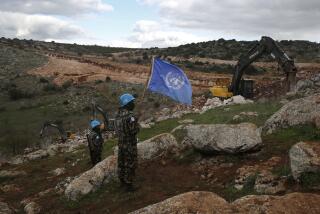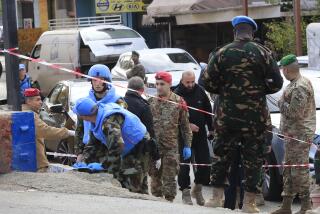Roadside bomb hits convoy of U.N. envoy to Iraq
- Share via
Reporting from Baghdad — A roadside bomb targeted the convoy of the U.N.’s special envoy to Iraq on Tuesday in the usually placid southern Shiite city of Najaf after his meeting with the country’s top Shiite religious leader, Grand Ayatollah Ali Sistani.
U.N. special representative Ad Melkert was unhurt in the attack, which struck an Iraqi police vehicle escorting him to the airport, U.N. spokeswoman Randa Jamal said. But the blast killed an Iraqi policeman and injured three other people, none of them United Nations employees, according to U.N. and Iraqi officials.
Though convoys are attacked on a nearly daily basis in other parts of Iraq, this incident was unusual because it occurred in a city considered safe, and because it targeted the U.N. After a 2003 suicide bombing in Baghdad killed the U.N.’s then-special representative, Sergio Vieira de Mello, and 21 staff members, the world organization pulled out of Iraq, and though it has since returned, it has generally maintained a low profile.
The extremist Sunni Muslim movement Al Qaeda in Iraq is not believed to have a presence in Najaf, and U.S. military officials suspect that the few attacks that do occur in the city 100 miles south of Baghdad are carried out by Iranian-backed Shiite Muslim militias.
The bombers may have thought U.S. officials were traveling with the convoy, Najaf officials said. But Melkert’s visit to Sistani was widely publicized and had political overtones.
Melkert held a televised news conference after the meeting at which he expressed his support for a U.S.-backed initiative to convene a meeting of all the political blocs in Iraq, with a view to breaking the 7-month-old deadlock in negotiations for a new government.
The attack came at a sensitive time in the talks, with Iran and the U.S. competing fiercely to influence the outcome. Iran is supporting an alliance between two Shiite factions, while the U.S. is pressing for a more inclusive government that would also give a prominent role to minority Sunnis.
Special correspondent Saad Fakhrildeen in Najaf contributed to this report.
More to Read
Sign up for Essential California
The most important California stories and recommendations in your inbox every morning.
You may occasionally receive promotional content from the Los Angeles Times.










